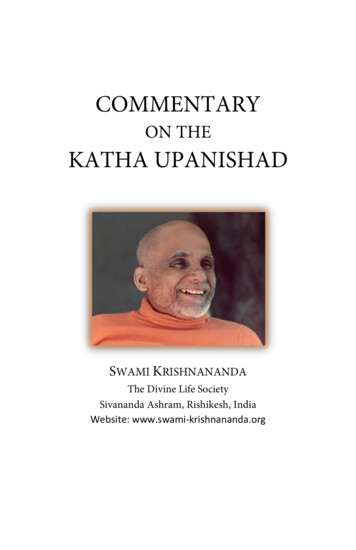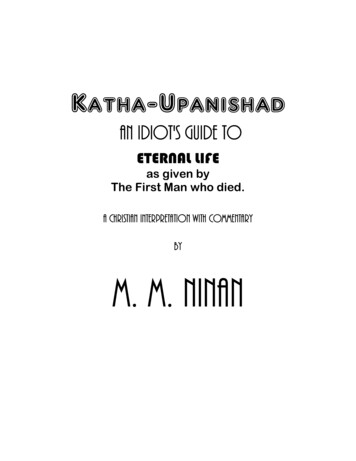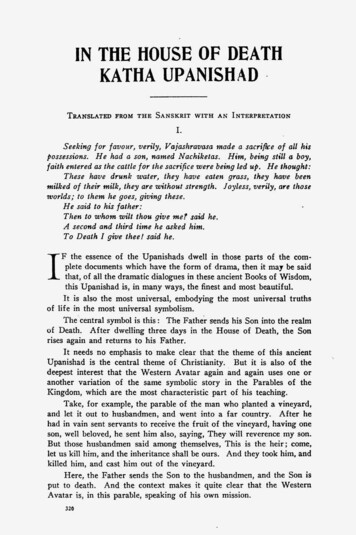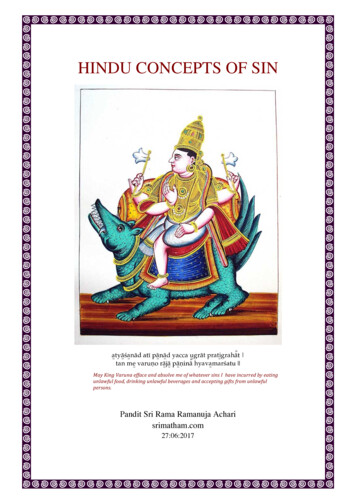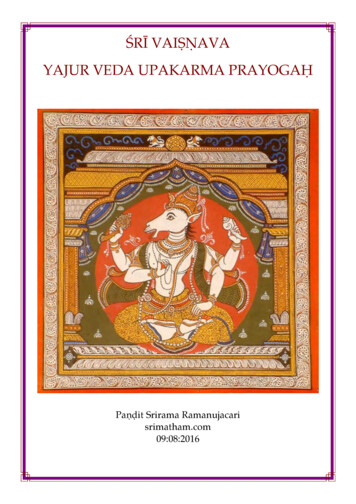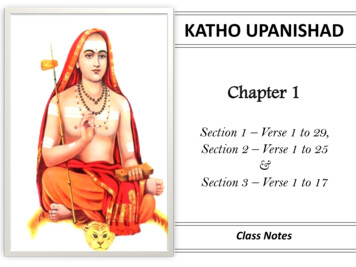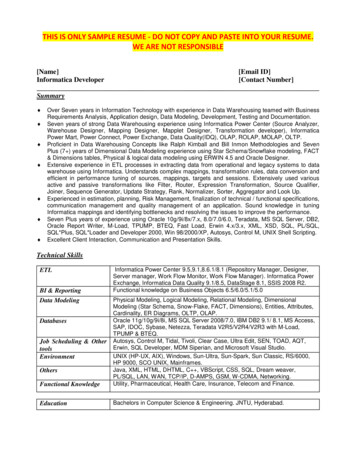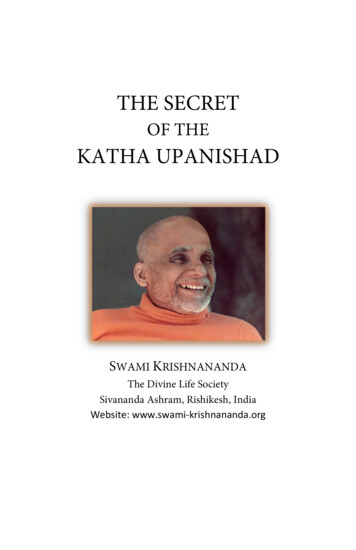
Transcription
Kaṭha UpaṇiṣadDialogue with masrimatham.comJuly 2014
2Kaṭha UpanishadChapter 1 Section 1Naciketas and His Fatheru̱śan ha̍ vai vā̱jaśravasaḥ sa̱rva-ve̍dasaṃ dadau ta̱sya ha̱ naci̍ketā nāma pu̱tra ā̍sa 1 uśan being desirous [of the rewards of the Viśvajit sacrifice]; ha and vai equivalent to 'once upon atime'. Vājaśrava he whose fame, is consequent on the giving of food, he dadau gave away ; sarvavedasam all (his) wealth; tasya of him; āsa there was ; ha as the story goes; naciketā nāmaputraḥ a son named Naciketas.1. Desirous(ofthefruitoftheVishva- yAt the time of this Upaniṣad, the sacrificial religion of the Brāhmaṇas was still popular.Desire for earthly and heavenly rewards was the prominent motive for all ritual activity(karma-khāṇḍa). The Upaniṣad leads us to a higher goal. 'He who is free from desirebeholds Him.' 2.20Vājaśravasa gave way all that he possessed. — He is represented as making a voluntarysurrender of all that he possessed, sannyāsa, in order to secure his spiritual interests.Naciketas: lit. “one who does not know and therefore seeks to know.”Cp. R.V. 'No knowledge of the gods have I, a mortal.' nāham devasya martyaś ciketa.' X.79. 5The author of the Upaniṣad attempts to distinguish between Vājaśravasa, the protagonistof an external ceremonialism (karma-khāṇḍa), and Nāciketas, the seeker of spiritualwisdom (jñāna-khāṇḍa). Vājaśravasa represents orthodox religion and is devoted to itsexternal superficial forms. He performs the sacrifice and makes gifts which are unworthy.The formalism and the hypocrisy of the father hurt the son.ta̱m ha ku̱māram santaṃ da̱kṣiṇāsu nī̱yamānāsu śra̱ddhā-’vi̍veśa so̱'manyata 2 tam into him, into Naciketā; kumāraṃ santam while still a mere boy: śraddhā faith (in the verityof the Scriptures), āviveśa entered; dakṣiṇāsu nīyāmāsu when gifts were being brought, [whencows meant for presents were being led separately, to the priests and the assembled Brāhmaṇas]; saḥ he, (Naciketā); amanyata aithenteredhim,althoughbuta(mere)boy;hethought .CommentarySraddhā faith. It is not blind belief but the kind of questioning which asks whether theouter performance without the living spirit is enough. Faith or rather 'conviction' arisesfrom doubt and should be resolved using reason and logic and is the conviction that acertain practice will lead to the specific goal.Prompted by the desire to do real good to his father, the boy felt worried about thenature of the presents he was giving away.
3pī̱toda̍kā ja̱gdha-tṛ̍ṇā du̱gdha-do̍hā niri̱ndriyāḥ a̱na̱ndā̱ nāma̱ te lo̱kās tān sa̱ gaccha̍ti tā̱ dada̍t 3 The cows meant for presents to the Brāhmaṇas are being described:Those by which udakam water, has been pītam drunk, are pītodakaḥ; those by which tṛṇam grass, has been jagdham eaten, are jagdha-tṛṇam; those whose dohaḥ milk, has been dugdhah milked, are dugdha-dohaḥ ; nirindriyāḥ those that are devoid of the power of their organs, incapableof breeding; [i.e. the cows are decrepit and barren], dadat giving ; tāḥ those, gacchati (he, theperformer of sacrifice) goes; tān to those (worlds); anandā aryNāciketas reveals here, with the enthusiasm of youth, the utter inadequacy of a formalselfless ritualism. The idea of complete surrender (sarva-vedasam dadau) in the firstverse should be properly interpreted as utter dedication or complete self-giving.True prayer and sacrifice are intended to bring the mind and will of the worshipper intoharmony with the Universe and the Divine.sa̱ hovāca pi̱taram tāta ka̱smai mām dāsyasīti dvi̱tīyam tṛ̱tīyam taguṁ ho̍vāca mṛ̱tyave̍ tvā dadāmīti 4 saḥ, he, approached his father ; and uvāca ha said; pitaram to the father. Tāta O father;kasmai to whom, to which of the priests; mām dāsyasi will you offer me, that is to say, offer me asa present? Though ignored by his father; dvitīyam trtīyam uvāca he spoke even a second time and athird time. Incensed at the thought, "This one is not behaving like a mere boy!" uvāca ha said, tam to him, mṛtyave to Death, dadāmi I give away; tvā you, iti this er)saidtohim,"UntoDeathshallIgiveyou!"CommentaryAs Vājaśravasa proposes to give away all his possessions, Nāciketas feels that thisinvolves the giving away of the son also and so wishes to know about himself. When thefather replies that he will give him to Yama, it may mean that, as a true sanyāsin, personalrelations and claims have henceforward no meaning for him. Nāciketas takes his father'swords literally. He in the course of his teaching points out that the psycho-physicalvehicles animated by the ātman are determined by the law of karma and subject to death.He who knows himself as the ātman, and not as the psycho-physical vehicle becomes freeand immortal.ba̱hūnām e̍mi prathamo ba̱hūnām e̍mi madhyamaḥ ki̱ggas svid yamasya̍ ka̱rta̱vya̱m ya̱n mayā̎'dya ka̱riṣya̍ti 5 bahūnām among many — of many sons or disciples; emi I go (rank); prathamaḥ as first, that isto say, through the foremost conduct of a disciple etc. And bahūnāṃ among many - many middlingones; madhyamaḥ emi I move (count) as a middling one, I behave through the middling conduct.Though I am a son possessed of such quality, still my father has said to me, "To Death I shall offeryou." Kim svit what; kartavyam purpose; yamasya of Death-can there be; which purpose he (myfather) adya today; kariṣyati will achieve; mayā through me?
throughme?'CommentaryI go — Among many who are dead I am in the middle. I am not the last. Many otherswill still follow me and there is no need for lamentation.Nāciketas in sadness reflects as to what help he has to render to Yama. There are threelevels of disciplic attention:—(1) Anticipating the teacher's or the parents' wishes and carrying them out is the wayof the best pupils;(2) promptly attending to what is ordered is the next best;(3) neglecting the instruction and wishes is the worst form of conduct of pupils orchildren.Nāciketas belonged to the first type; even at his worst he was never negligent of hisduty to his father.a̱nupa̍śya ya̍thā pū̱rve̱ pra̱tipa̍śya ta̱thā'pa̍re sa̱syam iva martya̍ḥ pacya̱te̱ sa̱syam iva jā̍yate̱ puna̍ḥ 6 anu successively, paśya consider, have a look at; yathā how; your, pūrve forebears, etc.behaved. Tathā similarly too; as apare others - other sages behave; them also; you prati-paśya consider; martyah humans; sasyam iva like corn, pacyate decays and dies; and after dying,punaḥ again; sasyam iva jāyate reappears (is born) again like n”.CommentaryThus what does one gain in this impermanent and transient world by breaking one's ownpromise? Be consistent to your own truth and send me to Yama. — This is the gist.Nāciketas, startled by his father's words, reflected and told his father who was nowapparently in a repentant mood, that he was much better than many sons, and there wasnothing to be gained by going back on his word. Nāciketas reminds his father that neitherhis ancestors nor his contemporaries who were and are decent ever broke their word.After all, human life is at best transitory. Like a blade of grass one dies and is born again.Death is not the end; rebirth is a law of nature. The life of vegetation on which all otherlife depends passes through the seasonal round of birth, growth, maturity, decay, deathand rebirth. The unity of all life suggests the application of this course to human beingsalso. This perpetual rebirth is not an escape from the wheel of becoming into a deathlesseternity. Even if we do not gain life eternal, survival is inescapable. So Naciketaspersuades his father to keep his word and send him to Yama's abode.
5Nāciketas in the Abode of YamaVājaśravasa sent Nāciketas to the abode of Yama in order to keep his word. And having gone toDeath's abode, Nāciketas waited there for three nights (i.e. days), Yama being out. When Yamareturned from his trip, his councillors or wives said to him:vaiśvānaraḥ pravi̍śaty atithi̍r brāhma̱ṇo gṛ̍hān tasyai̍tāguṁ śā̱ntiṃ ku̍rvanti ha̱ra vai̍vasva̱toda̍kam 7 brāhmaṇaḥ a Brāhmin; as atithiḥ guest; praviśati enters, like vaiśvānaraḥ fire itself; as thoughburning gṛhān the houses; tasya for his sake - for the guest; kurvanti accomplish: etām thiskind of; śāntim propitiation - consisting in offering water for washing feet, a seat, etc., just as peopledo for allaying the conflagration of fire - and since evil consequences are declared in case of not doingso (Mu.1.ii.3), therefore vaivasvata O Death; hara carry, udakam water - for Nāciketa forwashing his hepeople)dohimthispeace- ‐offering;bringwater,OSonoftheSun"!CommentaryAs fire is appeased by water, so is a guest to be entertained with hospitality. The wordfor fire used here is Vaiśvānara, the universal fire, which affirms the unity of all life.The guest comes as the embodiment of the fundamental oneness of all beings.In the Brāhmaṇa account, Naciketas goes to Yama's house, at the command of a divinevoice. He waits for three nights before Death returns and shows him hospitality due to aguest.ā̱śā-pra̍tīkṣe sa̱ṅgatagu̍ṁ sūnṛtāṃ ce̱ṣṭā-pū̍rte pu̱tra-pa̱śūggaś ca sarvān e̱tad vṛ̍ṅkte puru̍śasyālpa̍-medha̱so̱ ya̱syāna̍śnan va̱sati̍ brāhma̱ṇo gṛ̍he 8 āśā is the hope for a desirable thing which is attainable though unknown; pratīkṣa is expectationfor something that is attainable and known; saṅgatam the fruit derived from the association withspiritual people; sūnṛta joy (in Vedic Sanskrit), 'kindly speech' in Jaina and later Brāhmanicalworks; iṣṭam fruit produced by sacrifice, pūrtam fruit resulting from such charitable works asplanting gardens, etc. putra-paśūṃśca sons and cattle; sarvān etat (sarvam etat) all this; (he)vṛṅkte excludes (from) i.e. destroys ; puruṣasya alpa-medhasaḥ from (i.e. of) a person of littleintelligence; yasya in whose; gṛhe house; brāhmaṇaḥ a Brāhmana; anaśnan not-eating,
6fasting; vasati abides. Therefore a guest should not be neglected under any condition. This is ginwhosehouseaBrahminremainsunfed.Yama's address to Nāciketasti̱sro rātrīr yad avā̍tsīr gṛ̱he̱ me̱ 'na̱śnan bra̍hman a̱tithi̍r namasyaḥ nama̍ste'stu brahman svasti me̍'stu ta̱smāt prati̍ trīn va̱rān vṛ̍ṇīṣva 9 brahman O Brāhmaṇa; yat since; avātsīḥ you have stayed; grhe me in my house; tisraḥ rātrīḥ for three nights; anaśnan without eating, atithiḥ a guest; and namasyaḥ worthy of beingsaluted (venerable) as you are; therefore; namaḥ te astu salutations be to you; Brahman OBrāhmaṇa; svasti let there be good fortune; me for me; (through the aversion of the negativeeffects accruing); tasmāt therefore, (from the lapse caused by your abiding in my house withoutfood) vṛṇīśva ask for; trīn varān three boons —any particular three things you like; prati one inrespect of each night you have spent without threeboons".Nāciketas's first wishśā̱nta-sa̍ṅkalpaḥ su̱manā̍ yathā syād vī̱ta-ma̍nyur gau̱tamo̍ mā'bhi mṛtyo tva̱t-prasṛ̍ṣṭam mā̱'bhi va̍det pra̱tī̱ta̱ e̱tat tra̍yāṇāṃ pra̱thama̍ṁ varaṁ vṛṇe 10 If you want to grant boons, then, mrtyo O Death; yathā as; my father; Gautamaḥ (his clan-name)syāt may become; sumanaḥ: gracious, calm of mind; and also; vīta-manyuḥ free from anger; māabhi towards me; me abhivadet may talk to me; tvat-prasṛṣṭam freed by you - sent home;pratītah regaining his memory - i.e. recognising (me), trayāṇāṃ of the three boons; vṛṇe I askfor; prathamam as the first boon; etat this one that has this purpose, viz the satisfaction of ḥ — he whose mind is freed from the anxiety of — "how will my sonbehave after being sent by me to the abode of Death".pratītah — "Favour me in such a way, that my father may not avoid me under the idea,that I have become a hungry ghost and should not be looked at! "ya̱thā pu̍rastād bha̱vitā̍ pratīta au̱ddāla̍kir āruṇir ma̱t-prasṛ̍ṣṭah sukhaguṁ rātrīḥ śa̱yitā̍ vīta-manyus tvāṃ da̱dṛśi̍vān mṛ̱tyu-mu̍khāt pramuktam 11yathā purastāt as before - the kind of affection that your father had towards you; Auddālaki refer tothe same (person), and he is Arunī the son of Aruna; or he bears two family names: pratītaḥ havingrecognised (you); bhavitā will become possessed of, in that very same way: mat-prasṛṣṭah beingpermitted by me; (your father) śayitā will sleep; during rātrīḥ nights other (future) nights too;sukham happily with a composed mind; vīta-manyuḥ free from anger; tvāṃ dadṛśivān havingseen you; mṛtyu-mukhāt pramuktam as having been freed from the grasp of Death.
erandseeingy
Kaṭha Upanishad Chapter 1 Section 1 Naciketas and His Father u̱śan ha̍ vai v ā̱jaśravasaḥ sa̱rva -ve̍dasa ṃ dadau ta̱sya ha ̱ naci ̍ket ā nāma pu̱tra ā̍sa 1 uśan being desirous [of the rewards of the Viśvajit sacrifice]; ha and vai equivalent to 'once upon a time'. Vājaśrava he whose fame, is consequent on the giving of food, he dadau gave away ; sarva .
